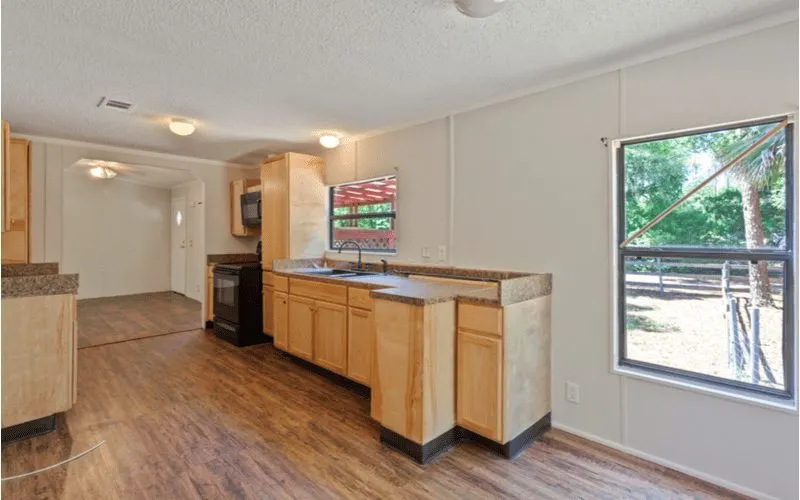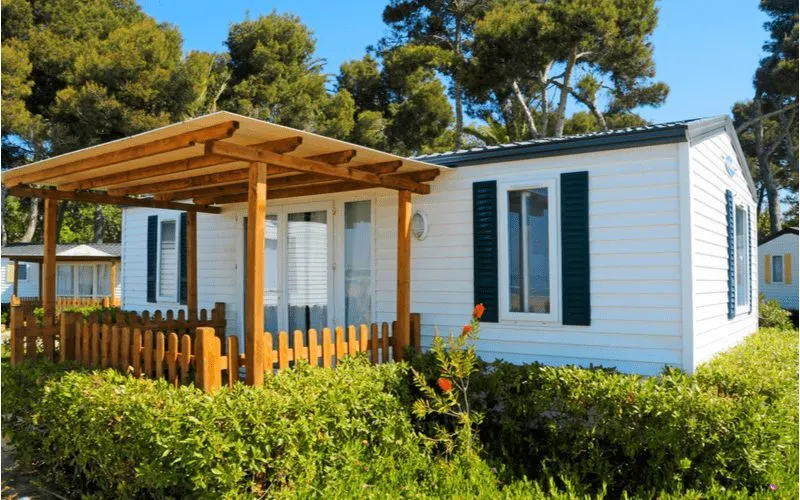Mobile home remodels aren’t easy. After all, many of the materials used are custom-built for your specific home.
But don’t worry—it can still be done. Read on to learn what you should know to give your home a facelift.
We partnered with Networx to save you big money on your next home renovation project. And quotes are free!
Considering a Mobile Home Remodel?
If you’ve hit a new stride in your career, if you’ve finally met your savings goals, or if you’ve come into a recent windfall, it may be time to consider a mobile home remodel.
Home is the place you lay your head, and if worries about the condition of your mobile home are keeping you up at night, you’re missing out on much-needed Zs.
Or, perhaps you’re considering investing in a mobile home with a friend or adding a gently used mobile home to your hunting camp, your rental property, or your family’s backyard (a mobile home makes a great mother-in-law suite).
No matter the reason, if you’re ready to kick off your mobile home remodel, you’ve come to the right place.
While there’s a hands-off way to remodel your mobile home, it likely won’t be as cost-effective as the do-it-yourself (or the hire-out-what-you-can’t-handle) method.
Successfully completing a remodel, especially if you’re not in the construction trade, requires careful consideration of your existing skills, extensive budgeting, and at least one bottle of ibuprofen. But it can be done!
Mobile Home Remodel: The Easy Button

Rido/Shutterstock
The seemingly easiest, most hands-off way to start a mobile home remodel is to hire a professional contractor. But this isn’t as easy as it sounds for a variety of reasons.
It’s essential to protect yourself during the hiring process to prevent getting swindled and be aware of some circumstances that may impact your ability to find a qualified contractor.
Contractors generally aren’t huge fans of working on mobile homes and, as a result, could offer you an exorbitant price for their services. Why?
- There’s a stereotype in the construction industry that mobile homes aren’t well-built. But if you’re even considering a mobile home remodel, yours is likely worth the investment, indicating its quality.
- Another stereotype is that only people of the lower economic class purchase mobile homes. Contractors will often refuse to offer an estimate, assuming that the homeowner won’t be able to afford their services.
- If you’re going to be moving your mobile home to a new property, contractors will likely have a hard time obtaining a building permit to work on it. In recent years, zoning laws have sought to prevent mobile homeowners from parking their homes in certain areas.
With a permitting process that’s already a pain for new construction, contractors likely won’t want to do the extra work of haggling with the building department.
Prices can change quickly in the building trade, so you should get any estimates in writing. Don’t settle for verbal agreements. Anyone who really wants to work on their mobile home will take the time to put the price on paper.
Make sure that anyone working on your home is licensed, insured, and bonded. If your builder goes out of business and fails to pay the roofing subcontractor, you don’t want to be stuck with the bill.
While hiring a contractor will ultimately save you the effort of doing a mobile home remodel yourself, significant front-end work and research are required to ensure that you’re going to get a fair shake.
If you’re cautious about handing off your entire project to a contractor, consider the do-it-yourself approach.
Mobile Home Remodel: The Budget Version

Pipas Imagery/Shutterstock
While DIY is very hip right now, perhaps you should consider a more practical method if you’re not a licensed contractor or don’t have any experience with major remodeling projects.
In all likelihood, you’ll be able to DIY numerous elements of your project. But if you’re anything like the average person, you either only know one skilled trade or you don’t know any. You’ll have to resign yourself to hiring out at least some of the work.
Especially when it comes to framing, roofing, HVAC system installation, plumbing, and electrical work.
But just because you’ll have to hire out some of the work shouldn’t keep you from your dream mobile home remodel. Before and during your remodeling process, you’ll want to explore and understand each of the major steps in any such project.
Determine Your Budget
Spreadsheets aren’t for everyone, but you’re going to need some way to control the cost of your mobile home remodel. For some elements of your budget, you’ll be perfectly qualified to determine how much you should spend.
You’ll likely have a ballpark figure for what you want to spend on interiors (like furniture, finishes, and decorations), but do you know what you’ll spend on framing lumber, drywall, or flooring?
Creating a budget for a mobile home remodel is a matter of determining what you want to spend overall and filling in the blanks for how much you want to spend on each construction phase. Start with the overall number: how much are you willing to pay, all told, for the project?
After you determine your overall budget, make a list of all of the construction phases and determine how much you think you want to spend on each stage. For some phases, you’ll have no idea, but there are some online tools to help you make a ballpark estimate.
For the skilled trades on your list (such as framing, roofing, plumbing, electrical, and HVAC), consult subcontractors for estimates and include these in your budget breakdown.
You may have to move money around between phases to make it work, but this document will help you stay on track during the construction process.
Secure Subcontractors
While untrained drywall hangers and finishers are unlikely to lose life and limb during a mobile home remodel, it would be downright dangerous to attempt some of the skilled trades you’ll need for your project.
Electrical work gone wrong, for instance, can result in significant injury or fatality. If you don’t have any experience framing, roofing, plumbing, performing electrical work, or installing or repairing HVAC systems, we strongly suggest that you hire subcontractors to perform these services.
During your budgeting process, secure written estimates from various subcontractors from each skilled trade you’ll need during the project. While you should get at least three estimates, you should get as many as you need.
Use the estimate request as a vetting process for your subcontractors. If two companies provide comparable prices, but one company offers better customer service, choose them. Having multiple options allows for decisions like this to be made during the process.
Once you’ve chosen your subcontractors, be sure to secure a date and time on their company’s calendar and sign a contract.
Many estimates expire after a certain number of days, but if you have an appointment on the books (or if you’ve paid a deposit upfront), you’ll lock in your prices.
Order Materials
Ordering materials for a mobile home remodel (or any construction project) can be challenging for those with no experience.
Some materials will be easy to order, like flooring. Since it’s usually sold by square feet, you’ll just need to measure or calculate the dimensions of each space and order flooring to fit the necessary quantity.
But be sure to order a little more than you think you need, especially in the case of flooring and wall coverings (tile, wood paneling, vinyl, et cetera).
But some materials will be harder to order if you’re an inexperienced mobile home remodeler. Most professionals rely on sophisticated take-off software to determine material quantities.
If you’re hiring out skilled tradesmen to subcontractors and want to order their materials for them, ask them to perform a material quantity estimate for you. In order to protect yourself, order slightly more than they recommend.
Excess materials can always be donated or resold at the end of the project. Make sure to order materials to be delivered in the proper sequence.
Unless you have access to large storage space, you likely won’t have a place to store 1,000 square feet of tile or wood flooring while the framing crew is still on the job. Schedule sensible delivery dates to prevent storage maladies during the project.
Obtain Permits
As previously discussed, permitting authorities can be fussy about mobile homes. If your mobile home is going to be relocated before or after the remodel, check with your relevant jurisdiction to ensure that you’ll be able to secure a permit.
Many permitting entities will have specific requirements for mobile homes, so be sure to specify this when performing your permitting research. Permitting is often a tedious process that requires significant documentation.
Be sure to store your permitting documents (particularly a paper copy of your approved permit) in a secure, dry location, like a construction doc box. Once you have a permit in hand, you’ll be ready to start your mobile home remodel.
Consult Relevant Sources
If you choose to DIY any part of your mobile home remodel, make sure that you’ve studied a tutorial or instructional guide for measuring, cutting, and installing any products or materials you’ve purchased.
If you’ve chosen to install tile floors yourself, and your materials and tile saw are ready and waiting, watch a few Youtube tutorials (and then watch them again) before getting started.
Then, if you make a mistake during the installation, make sure you have access to those tutorials so that you can return to them and adjust your method.
Many hardware stores offer free classes for DIY projects, which are also excellent resources. By taking a class, you’ll gain familiarity with the process and be able to ask questions while you’re practicing.
Better yet, ask a friend who has completed a mobile home remodel of their own. Consider asking for their help during the process—many hands make light work, after all—or have them on speed dial if you want to go it alone.
While doing any of the work yourself during your mobile home remodel will be very satisfying, messing up is inevitable. Make sure to gather your sources early, and ensure that you can consult them for any game-day mishaps.
Document the Process
Photos and scrapbooks aren’t just for posterity—though it will feel great to brag to your friends about your mobile home remodel. Documenting the various phases of construction and material installation will protect you in the event of any potential legal action.
For example, if a building inspector from your local permitting jurisdiction thinks that there may be an installation issue with the electrical equipment, showing them photos of the installation process could help them determine the extent of the error or dispel their worries.
While building inspectors are there to protect you, they’ll appreciate having as much information as possible at the time of inspection, especially if they identify a problem.
Photos may also inspire other DIYers to take on their own mobile home remodel. Consider posting pictures and text about your experience online. In all likelihood, you’ll consult a source like this during your remodel, so why not contribute to a growing body of knowledge?
Sharing your process and the resources that you consulted could pave the way for someone else to successfully DIY their mobile home remodel.
Create Punch Lists
A punch list is a common name for a formal list of all remaining items left to do at the end of a project or during a specific project phase. While your subcontractors will often create their own punch lists, ask to be a part of the process.
You may not know enough to identify potential punch list items for some trades, but listening in on the process will ensure that everything on the punch list is accomplished before your subcontractor closes out.
And, as suggested above, ensure that you have a copy of any punch lists created. A punch list is most useful at the end of your mobile home remodeling project.
Walk through the house (preferably with someone else who may catch something you missed), make a list of all outstanding items, and make a plan for completing them. Some common punch list items include:
- Touching up paint on ceilings and trim
- Repairing cracks in tile or scratches on wood floors
- Applying and testing caulk and other seals
- Checking that doors are hung straight
- Testing the windows to make sure they open and close easily
- Installing door locks and other hardware
- Moving in your furniture and other interior elements
- Testing all appliances and systems
- Labeling the breakers in your electrical box (if the electrician didn’t do this for you)
In all likelihood, your building inspector will want to take a look at your punch list during your final inspection.
And, in the event that you don’t pass your final inspection, they’ll help you add items to the list so that you have documentation of the steps you need to take in order to pass.
A punch list is an excellent tool, and it will ensure that your mobile home remodel is completed precisely to your liking.
Enjoy!
The final step is to sit back and relax in your remodeled mobile home! When your mobile home remodel is complete, you’ll feel a sense of pride in a job well done. If you’re the entertaining type, invite a few friends over for a housewarming party.
Walking them through your home, showing them all of the changes that you’ve made, and answering their questions about the process will be incredibly gratifying and could inspire one of your friends to start their own mobile home remodel.
Mobile Home Remodel FAQ

Nito/Shutterstock
If you’re reading this guide before starting your mobile home remodeling process, you might be a little overwhelmed. Let’s explore some frequently asked questions to put your mind at ease.
Is a Mobile Home Remodel Worth It?
It depends on your definition of “worth it.” Financially, the older your mobile home is, the more likely it is that it’s depreciated significantly in value.
Consider your budget. If the amount you want to spend to remodel it is more than you’d spend on a new mobile home, consider decreasing your budget or purchasing a new mobile home.
But, if the mobile home will become a rental property, consider potential rental income as a return on your investment.
However, if you need to perform a mobile home remodel to improve your quality of life, the end result will be worth it. Be sure to consider all of your options to come to a sound conclusion.
How Do I Know If a Subcontractor Is Reliable?
Do your homework. Be sure to inquire about potential subcontractor’s financial status, ask for reviews from past clients, and verify that they are licensed and insured.
If a subcontractor is cagey about providing any of this information, they’re likely not the subcontractor for you.
In the current climate, where the US is experiencing a significant trade labor shortage, it may seem like you don’t have many options when searching for a subcontractor.
But stay hopeful that you’ll find the right person. Your patience will pay off when you find the right company.
Can I Change the Layout of My Mobile Home?
Absolutely! The beauty of a mobile home remodel is that you can move walls, demolish walls, and build new walls, opening up your space or making a new enclosed room.
That said, moving walls while maintaining the structural integrity of your mobile home is no small feat. Consider consulting a structural engineer to confirm that your plans to move walls are feasible.
We partnered with Networx to save you big money on your next home renovation project. And quotes are free!
Should You Remodel Your Mobile Home?
Reading this guide is only the first step in your mobile home remodeling process. If you’re ready to start the process, you’re about to have a long to-do list.
But stay motivated, consider all of the circumstances that will impact the remodeling project, and remain vigilant. Most of all, keep your eye on the prize: a freshly remodeled mobile home.


